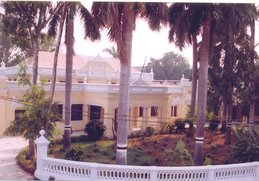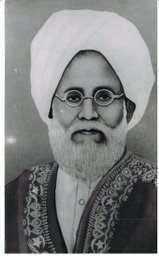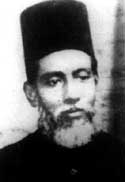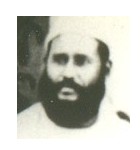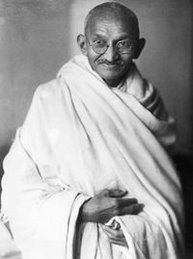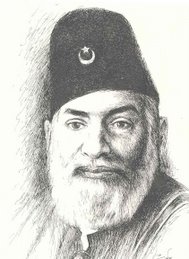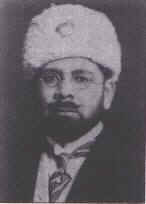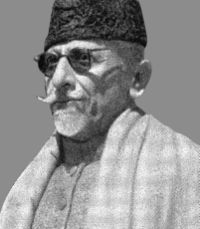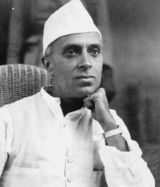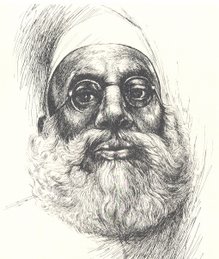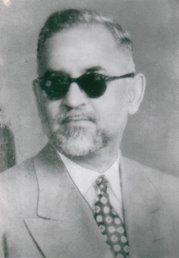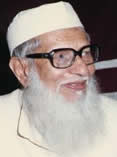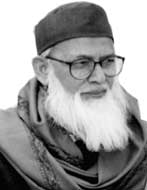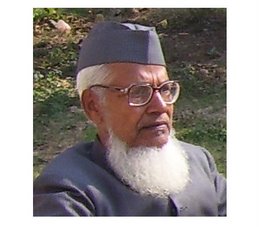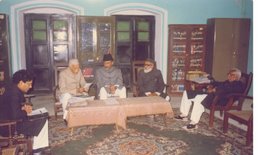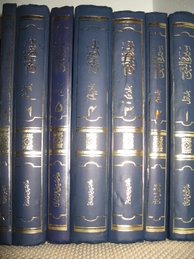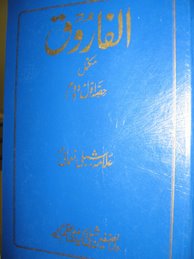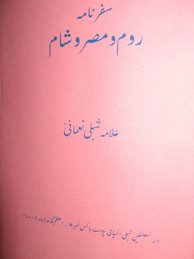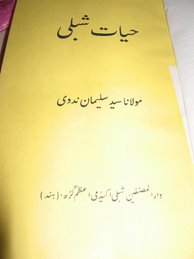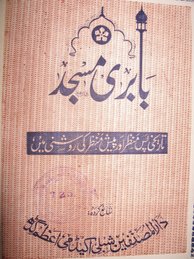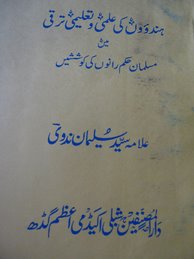of
Islamic studies
&
Oriental learning
http://shibliacademy.org
EARLY HISTORY
The Darul Musannefin Shibli Academy was established on November 21, 1914, three days after the death of its founder Maulana Shibli Nomani. He was an erudite scholar and a versatile writer, the Maulana was quick to grasp the need for a modern institution for the study of and research in the various branches of Islamic learning and oriental languages. Both logic and history seemed to confirm his belief that in the absence of well-directed and concentrated research, culture and education tend to get stagnated. To re-orientate the basic concepts of medieval Islamic education and to interpret Islamic history and philosophy in modern terms could introduce an element of dynamism in the entire field of learning. With this end in view he made a two pronged attack on intellectual decadence.In the sphere of education, Shibli helped to found the NadwatuI Ulama, at Lucknow, a model institution for teaching of Arabic and Islamic studies, while in the field of research, he conceived of the plan of Darul Musannefin.An outline of the organisation was first published by Maulana Shibli in the Al-Hilal, the well-known weekly of Maulana Abul Kalam Azad. Maulana Abul Kalam Azad was so impressed by the plan that when Maulana Syed Suleman Nadvi later after his mentors death offered the fellowship of Darul Mussanefin to Maulana Azad, he wrote back to him that he would deem it an honour to serve the Academy even in the capacity of a coolie. Maulana Shibli had formulated an ambitious plan but all that he could achieve before his death, on November 18, 1914, was to create an endowment of his spacious garden, two kutchcha bungalows and about 300 books to form the nucleus of a library. He had, however, created a small group of co-workers and pupils who could carry the work further and had also compiled a few standard works to serve as pilot project.
DEPARTMENTS
It was left to his pupils and co-workers, Maulana Hamiduddin Farahi, Maulana Syed Sulaiman Nadwi and Maulana Masood Ali to elaborate his ideas into actual practice. Two years after its inception, the progress of work at the Darul Musannefin Shibli Academy necessitated its re-organisation into seven departments to facilitate research and study on modern lines. These were the Departments of Seerat-e-Nabavi, Research Department, Publication Department, monthly Ma’arif, Library, Buildings Department and the Printing Press. It now became an integrated and self contained institution where research, editing, collation, compilation, calligraphy, printing and sales were organised as parts of a unified process.The Academy also blazed a new trail for the Indian Ulama, who had hitherto been engaged, with few exceptions, in rehashing old material, annotating difficult books, writing comment or expounding the controversial variations in Fiqh. The Academy opened up for them many a new vista of creative writing. But the impact transcended the immediate gains of individual Ulama. The literary and scholastic pursuit, which had slumped into decadence, began coming into its own once again.
PUBLICATIONS
The Academy did rekindle in the minds of the Ulama the desire for creative and critical study of Islamic history and other branches of Muslim learning. With the zeal of a missionary, Maulana Shibli had already produced a large number of books on a variety of subjects and these served as models for the writers who followed. His Sher-ul-Ajam for example, is a history of the Persian language and literature and Mowazina-i-Anis-o-Dabeer is a masterpiece of literary criticism in Urdu. Two other books Al-Farooq and Al-Mamoon are the first important Islamic biographies in Urdu. But his work of monumental dimensions is the Seerat-un-Nabi (Life of the Prophet) for which a separate Department had to be created later. Shibli had collected a stupendous volume of material on the subject but he had attempted only the first two of the six volumes of the seerat, when death cut short a brilliant career. The rest of material was arranged and put into shape by his trusted pupil and colleague, Syed Sulaiman Nadvi.The work had been acknowledged to be the most authentic and comprehensive account of the various facets of Prophet Muhammad’s life and teachings. Turkey has already translated it in Turkish, while Pakistan and U.A.R. are rendering it into English and Arabic respectively. The work, perhaps for the first time, attempts to put the historical role of Islam and its Prophet into correct perspective and underlines Prophet’s contribution to the cause of human progress, universal peace and brotherhood, and his spiritual and moral achievements.Inspired by the zest and the noble motives of the founder, the Academy has, during the last half of a century, published about 100 volumes of edited or compiled works by its Fellows. Some of these works are indeed encyclopedic in character. Besides the Seerat-un-Nabi the collection of the biographical sketches of the companions of the Holy Prophet, entitled the Seyar-us-Sahaba, is also a stupendous work.The AI-Farooq ( the Life of Caliph Omar) by Maulana Shibli, has won recognition from the scholars of Iran and Afghanistan, where its translation was undertaken, as a remarkable book still unsurpassed for its scholarly treatment The English translation of this book was attempted by Maulana ZafarAli Khan.In the literary field, Maulana Shibli’s Sher-ul-Ajam was highly spoken of by Prof. Browne of the Cambridge University and even today it enjoys great reputation among scholars. It has been translated in Iran and Afghanistan. Similarly, the life and work of the famous poet, Omar Khayam, by Syed Sulaiman Nadvi, is regarded as an outstanding work of research and criticism and has been translated into Persian in Iran. The Sher-ul-Hind (in two volumes) by Abdus Salam Nadvi and Gul-i-Rana by Abdul Hai are valuable critical history of Urdu poetry.In the field of history and culture, the Academy, has published a large number of books, many of which have received awards from the State or the Central Government. So far, it has published 15 volumes on Islamic history and 17 on the history of Medieval India.The number of books published and the variety of subjects covered constitute an impressive record. These include Life of the Holy Prophet (6 Volumes), other biographies (23 Volumes), Literature (17 Volumes), History of Medieval India (17 Volumes), Islamic History (17 Volumes), Philosophy (11 Volumes), Arabic works (5 Volumes), Geographical History (2 Volumes), Dictionary. (1) Volume), Psychology (2 Volumes), Miscellaneous (17 Volumes), Total:118 volumes, number of pages: 39,481. A large number of these works have been prescribed for the degree courses of the various universities of India and Pakistan. In the next seven years the Academy proposes to bring out 20 volumes on different aspects of history, culture and Islamic religion.
ACADEMY’S JOURNAL
The monthly journal of the Academy, the Ma’arif is respected for the standard of scholarship and research it has maintained, and for the specialized fare it has provided on Islamic studies and culture. It has had few rivals in Urdu language during the last 93 years. It attracted the elite of intellectual life and among its contributors have been writers, authors, poets theologians and administrators of proven ability.
Darul Musannifeen's founder, Allama Shibli Nomani, its first president Maulana Hamiduddin Farahi and its first administrator Maulana Sayyid Sulaiman Nadwi, enjoy international fame as scholars. In addition to them, Maulana Abdus Salam Nadwi, Prof. Abdul Bari Nadwi, Maulana Abu Zafar Nadwi, Maulana Abul Jalal Nadwi, Prof. Sayyid Najib Ashraf Nadwi, among other, are also worth mentioning.
OFFICE HOLDERS AND ADMINISTRATIVE AUTHORITIES
The life throb of the Academy is undeniably its well equipped library. From the nucleus built by Maulana Shibli, it has grown into a big store house of knowledge. During the last 50 years, books have been continuously added into its shelves and now it contains thousand of books, including some rare manuscripts and publications. The library offers to research workers and scholars a very wide range of literature on a large variety of subjects.
On account of the cosmopolitan and constructive outlook, the Academy, from its very inception, earned encouragement from leaders of all shades of thought Among them are Mahatma Gandhi, Pandit Jawaharlal Nehru, Maulana Abul Kalam Azad, Sir Tel Bahadur Sapru, Acharya Narendra Dev, Shri Jaya Prakash Narain , Pandit Motilal Nehru, Dr. Zakir Husain, Shri Lal Bahadur Shastri, Syedana Dr. Tahir Saifuddin, Maulana Shaukat Ali, Dr.M. A. Ansari, Shri Rafi Ahmad Qidwai, Shri A.A.A. Fyzee, Maulana Hasrat Mohani and Maulana Husain Ahrned Madani. Pandit Moti Lal Nehru, in particular, had a special attachment for the institution. Whenever his legal or political work brought him to the area, and such occasions mainly, he preferred to stay as a guest of the Academy. Jawahar Lal Nehru followed in the footsteps of his illustrious father and associated himself with it as a Life Member.Most of this galaxy has been very welcome but only casual visitors to these premises. Its most frequent guests have been scholars and authors who come to this unpretentious corner in search of knowledge and truth and enjoyed the frugal but sincere hospitality of the Academy’s workers.
FINANCIAL AID
You have seen a glimpse of the services and achievements of Darul Musannefin Shibli Academy, Azamgarh, in the previous pages. of an article published by Press Information Bureau, Government of India, New Delhi, on the occasion of the Golden Jubilee celebration of the Academy in 1965. Dr Zakir Husáin, the then Vice President of India and member of the Managing Committee of Darul Musannefin, presided over the function which proved a great event in the history of the Academy. Learned scholars and intellectuals from all over India participated and appreciated the contribution of Darul Musannefin, a unique institution founded by Allama Shibli Nomani. On this occasion an outline of a programme was prepared for writing and publishing further books in the field of history of India series of the Academy.The Government of India offered financial assistance for the publication of these books. Consequently several books were written by the Academy’s scholars and fellows and the expenses of their publication were met by the Government of India.Maulana Masood Au Nadvi, the last man of the small band of founder members of the Academy, was very weak and saw the Golden Jublee celebration from his bed. All the preparations and arrangements were made by Maulana Shah Moinuddin Nadvi and his colleague Syed Sabahuddin Abdur Rahman. After the death of Maulana Masood Ali Nadvi in 1968 and later of Shah Moinuddin Nadvi in 1974, the responsibilities of the Academy fell on the shoulders of Syed Sabahuddin Abdur Rahman who managed it very efficiently during his time. For a brief period, Maulana Abdus Salam Qidwai also assisted him, but he died within a few years.Syed Sabahuddin Abdur Rahman was endowed with both a scholar’s intellect and an administrator’s wisdom. He wrote thousands of pages on cultural history of medieval India, on the one hand and devised means to make the Academy financially stable and strong, on the other, thereby glorifying the name of Darul Musannefin in the whole world. In 1982 he organised a world Seminar on Islam and Orientalists. Delegates, from all over India, Pakistan, Bangladesh, Arab Countries, Iran, Thailand, Japan and South Africa participated. A large number of papers were presented in Urdu and Arabic. They were later published by the Academy in several volumes. In 1987 the great luminary Syed Sabahuddin Abdur Rahman died in a road accident at Lucknow and an era of 52 years of devoted service came to an end. There after Maulana Ziauddin Islahi was appointed Nazim of Literary Section and Syed Shahabuddin Desnavi Secretary of Administrative Section. In 1992 Abdul Mannan Helali was appointed Hon. Jt. Secretary to look after the Administrative Section. After the death of Syed Shahabuddin Desnavi, Maulana Ziauddin lslahi became secretary (Nazim) of the Academy.From the very beginning Darul Musannefin has been doing pioneer work in the field of Islamic studies, medieval history and oriental languages and literature without any regular grant from the Government although it received some financial assistance now and then.After the partition demand of Urdu books declined and restrictions on export of books affected the Academy’s sale adversely. Even then the Academy has succeeded to bring out 198 books up to 2004 under the following heads.1. Life of the Holy Prophet (9),2. Other Biographies (43),3. Literature (48),4. History of India (31),5. Islamic History (12),6. Philosophy, Psychology and Sociology (18 vols),7. Arabic Works (6 vols),8.English (3 vols)9. Islam and Orientalists (6 vols),10. Miscellaneous (22).Total 198 books.Maulana Ziauddin Islahi, the leader of the Academy’s Carvan, managed to hold a World Seminar of Almi Rabta-e-Adab-e-lslami in 1995 on Sawaneh Nigari and about hundred delegates took part. The Seminar was inaugurated by Maulana Syed Abul Hasan Ali Nadvi, the World President of the Rabta and also the President of the Executive Committee of Darul Musannefin.
In 2002 Mr. Amar Singh, Member of Parliament visited the Academy and was highly impressed by its scholars achievements and devotions, its rich library and the precious manuscripts that it treasures. He sanctioned a grant of 25 lacs (The maximum that he could sanctioned under rules) for constructing a two-storied building for library and Conference Hall. The specious Hall (90'x30') was inaugurated on the occasion of a two day International seminar on "Allama Shibli Nomani: Life and works." Maulana Mohammad Rabey Husni Nadvi, President of All India Muslim Personal Law Board, Rector of the Nadwa-Tul-Ulama, Lucknow, and a member of the Managing Committee of Darul Mussannefeen, presided over the inaugural session. Eminent scholars participated in the five sessions of the seminars which was grand success in all respects. This addedd another feather to the cap of Maulana Ziauddin Islahi, The secretary of the Academy.
I. BOOKS RELATED TO SEERAT-UN-NABI
1.-SEERAT-UN-NABI –I -ALLAMA SHIBLI NOMANI
2.-SEERAT-UN-NABI –II -ALLAMA SHIBLI NOMANI
3.-SEERAT-UN-NABI –III -SYYED SULAIMAN NADWI
4.-SEERAT-UN-NABI –IV -SYYED SULAIMAN NADWI
5.-SEERAT-UN-NABI –V -SYYED SULAIMAN NADWI
6.-SEERAT-UN-NABI –VI -SYYED SULAIMAN NADWI
7.-SEERAT-UN-NABI –VII -SYYED SULAIMAN NADWI
8.-KHUTBAAT MADRAS -SYYED SULAIMAN NADWI
9.-RAHMAT-E-ALAM -SYYED SULAIMAN NADWI
10.-MUQADMA SEERAT-UN-NABI -ALLAMA SHIBLI NOMANI
II. BOOKS RELATED TO SEERAT-UL SAHABAH, TABAEEN & TABA TABAEEN
11.-SEERAT-UL-SAHABA –I (KHULAFA-E-RASHEDEEN)
By HAJI MOINUDDIN NADWI
12.-SEERAT-UL-SAHABA –II (MAHAJEREEN –I)
By HAJI MOINUDDIN NADWI
13.-SEERAT-UL-SAHABA –III (MAHAJEREEN –II)
By SHAH MOINUDDIN AHMAD NADWI
14.-SEERAT-UL-SAHABA –IV (SEERAT-UL-ANSAR –I)
By MAULANA SAEED ANSARI
15.-SEERAT-UL-SAHABA –V (SEERAT-UL-ANSAR –II)
-MAULANA SAEED ANSARI
16.-SEERAT-UL-SAHABA –VI
(IMAM HASAN, AMEER MAAWIA, IMAM HASAN
& ABDULLAH BIN ZUBAIR KE HALAAT)
-SHAH MOINUDDIN AHMAD NADWI
17.-SEERAT-UL-SAHABA –VII (ASAAGHIR SAHABA)
-SHAH MOINUDDIN AHMAD NADWI
18.-SEERAT-UL-SAHABA –VIII (SEERAT-UL-SAHABIAT)
-MAULANA SAEED ANSARI
19.-SEERAT-UL-SAHABA –IX (ASWAH SAHABA –I)
-MAULANA ABDULSALAM NADWI
20.-SEERAT-UL-SAHABA –X (ASWAH SAHABA –II)
-MAULANA ABDULSALAM NADWI
21.-SEERAT-UL-SAHABA –XI (ASWAH SAHABIAT)
-MAULANA ABDULSALAM NADWI
22.-AHL-E-KITAAB SAHABA-WA-TABAEEN
-MAULANA HAFIZ MUJEEB ULLAH NADWI
23.-TABAEEN
-SHAH MUEENUDDIN AHMAD NADWI
24.-TABA TABAEEN –I
-MAULANA HAFIZ MUJIB-ULLAH NADWI
25.-TABA TABAEEN –II
-DR. MOHD. NAEEM SIDDIQUI NADWI
III. BOOKS RELATED TO TAAREEKH-E-ISLAM
26.-TAREEKH-E-ISLAM –I (ABD-E-RISAALAT)
-SHAH MUEENUDDIN AHMAD NADWI
27.-TAREEKH-E-ISLAM –II (BANU UMMIYAH)
-SHAH MUEENUDDIN AHMAD NADWI
28.-TAREEKH-E-ISLAM –III (BANI ABBAS)
-SHAH MUEENUDDIN AHMAD NADWI
29.-TAREEKH-E-ISLAM –IV (BANI ABBAS)
-SHAH MUEENUDDIN AHMAD NADWI
30.-TAREEKH DAULAT-E-USMANIA –I
-MOHD. UZAIR (ALIG)
31.-TAREEKH DAULAT-E-USMANIA
-MOHD. UZAIR (ALIG)
32.-TAREEKH SAQLIA –I
-S. RIYASAT ALI NADWI
33.-TAREEKH SAQLIA –II
-S. RIYASAT ALI NADWI
34.-TAREEKH ANDLAS –I (MUJALLID)
-S. RIYASAT ALI NADWI
35.-HAMARI BADSHAHI
-ABDUSSALAM KIDWAI NADWI
36.-SALEEBI JUNG-
S. SABAHUDDIN ABDUL-REHMAN
37.-BAHADUR KHAWATIN ISLAM
-SYED SULAIMAN NADWI
38.-ISLAM MEIN MAZHABI RAWADARI
-S. SABAHUDDIN ABDUL-REHMAN
IV- BOOKS RELATED TO QURANIYAAT
39.-TAREEKH ARZUL QURAN –I & II-
SYED SULAIMAN NADWI
40.-TALEEM-UL-QURAN
-MOHD. UWAIS NAGRAMI NADWI
41.-JAMA-WA-TADWEEN QURAN
-SYED SIDDIQ HASAN
V. BOOKS RELATED TO TAAREEKH-E-HIND
42.-MUQADMA RUQAAT ALAMGIR
-S. NAJEEB ASHRAF NADWI
43.-BAZAM-E-TAIMURYA –I
-S. SABAHUDDIN ABDUL-REHMAN
44.-BAZAM-E-TAIMURYA –II
-S. SABAHUDDIN ABDUL-REHMAN
45.-BAZAM-E-TAIMURYA –III
-S. SABAHUDDIN ABDUL-REHMAN
46.-BAZAM-E-SUFIYA
-S. SABAHUDDIN ABDUL-REHMAN
47.-HINDUSTAN KE AHD-E-WASTA KI EK JHALAK
-S. SABAHUDDIN ABDUL-REHMAN
48.-MUKHTASAR TAREEKH-E-HIND
-SYED ABU ZAFAR NADWI
49.-HINDUSTAN KI KAHANI
-ABDUSSALAM KIDWAI NADWI
50.-TAREEKH-E-SINDH
-SYED ABU ZAFAR NADWI
51.-HINDUSTAN KE AHD-E-WASTA KA FAUJI NIZAM
-S. SABAHUDDIN ABDUL-REHMAN
52.-HINDUSTAN ARBON KI NAZAR MEIN –I
-ZIAUDDIN ISLAHI
53.-HINDUSTAN ARBON KI NAZAR MEIN –II
-ZIAUDDIN ISLAHI
54.-GUJARAT KI TAMADDUNI TAREEKH
-SYED ABU ZAFAR NADWI
55.-HINDUSTAN KE MUSALMAN HUKMARANON KE TAMADDUNI JALWE
-S. SABAHUDDIN ABDUL-REHMAN
56.-BAZM-E-MAMLUKIAH
-S. SABAHUDDIN ABDUL-REHMAN
57.-HINDUSTAN KE HUKMARANON KE AHD KE TAMADDUNI KARNAMEN
-PUBLISHER
58.-HINDUSTAN KE SALATEEN, ULAMA AUR MASHAIKH KE TALUQAAT PAR EK NAZAR
-S. SABAHUDDIN ABDUL-REHMAN
59.-KASHMIR SALATEEN KE AHAD MEIN
-Trans: ALI HAMMAD ABBASI
60.-HINDUSTAN AMEER KHUSRO KI NAZAR MEIN
-S. SABAHUDDIN ABDUL-REHMAN
61.-ZAHEERUDDIN MOHD. BABAR (HINDU MUSLIM MOARREKHIN KI NAZAR MEIN)
-S. SABAHUDDIN ABDUL-REHMAN
62.-HINDUSTAN KI BAZM-E-RAFTA KI SACHCHI KAHANIAN –I
-S. SABAHUDDIN ABDUL-REHMAN
63.-HINDUSTAN KI BAZM-E-RAFTA KI SACHCHI KAHANIAN –II
-S. SABAHUDDIN ABDUL-REHMAN
64.-ISLAMI ULOOM-WA-FUNOON HINDUSTAN MEIN
-Trans: ABUL-IRFAN KHAN NADWI
65.-HINDUSTAN KI QADEEM ISLAMI DARSGAHEN
-ABUL-HASNAAT NADWI
66.-ARAB-WA-HIND KE TALUQAAT
-SYED SULAIMAN NADWI
67.-HINDUSTAN KE MUSALMAN HUKMARANON KI MAZHABI RAWADARI –I
-S. SABAHUDDIN ABDUL-REHMAN
68.-HINDUSTAN KE MUSALMAN HUKMARANON KI MAZHABI RAWADARI –II
-S. SABAHUDDIN ABDUL-REHMAN
69.-HINDUSTAN KE MUSALMAN HUKMARANON KI MAZHABI RAWADARI –III
-S. SABAHUDDIN ABDUL-REHMAN
70.-AHAD-E-MUGHLIYA MEIN HINDUSTAN SE MUHABBAT-WA-SHEEFTAGI KE JAZBAAT
-S. SABAHUDDIN ABDUL-REHMAN
71.-AURANGZEB ALAMGIR PAR EK NAZAR
-ALLAMA SHIBLI NOMANI—
VI. TAZKARAH-WA-SAWANEH
72.-ALFAROOQ
-ALLAMA SHIBLI NOMANI
73.-ALGHAZALI
-ALLAMA SHIBLI NOMANI
74.-ALMAMOON
-ALLAMA SHIBLI NOMANI
75.-SEERAT-UL-NOMAAN
-ALLAMA SHIBLI NOMANI
76.-SEERAT OMAR BIN ABDUL AZIZ
-MOULANA ABDUSSALAM NADWI
77.-SEERAT AYESHA
-MOULANA SYED SULAIMAN NADWI
78.-HAYAT SHIBLI
-MOULANA SYED SULAIMAN NADWI
79.-IMAM RAAZI
-MOULANA ABDUSSALAM NADWI
80.-HAZRAT KHWAJA MOINUDDIN CHISHTI
-S. SABAHUDDIN ABDUL REHMAN
81.-HAZRAT ABUL HASAN HAJVERI
-S. SABAHUDDIN ABDUL REHMAN
82.-HAYAT-E-SULAIMAN
-SHAH MOINUDDIN AHMAD NADWI
83.-MOULANA SHIBLI NOMANI PAR EK NAZAR
-S. SAHABUDDIN ABDUL REHMAN
84.-TAZKERAT-UL-MOHADDESIN –I
-MOULANA ZIAUDDIN ISLAHI
85.-TAZKERAT-UL-MOHADDESIN
-MOULANA ZIAUDDIN ISLAHI
86.-TAZKERAT-UL-MOHADDESIN
-MOULANA ZIAUDDIN ISLAHI
87.-MOHAMMAD ALI KI YAAD MEIN
-S. SABAHUDDIN ABDUL REHMAN
88.-YAAD-E-RAFTGAN
-MOULANA SYED SULAIMAN NADWI
89.-BAZM-E-RAFTGAN –I
-S. SABAHUDDIN ABDUL REHMAN
90.-BAZM-E-RAFTGAN –II
-S. SABAHUDDIN ABDUL REHMAN
91.-SUFI AMEER KHUSRO
-S. SABAHUDDIN ABDUL REHMAN
92.-TAZKERAT-UL-FUQAHAA –I
-UMAIRUSSIDDIQ DARYABADI NADWI
93.-TAZKARAH MUFASSERIN-E-HIND –I
-MOULANA MOHD. ARIF UMRI
94.-MOULANA ABULKALAM AZAD
-MOULANA ZIAUDDIN ISLAHI
95.-SAWANEH MOULANA ROOME
-ALLAMA SHIBLI NOMANI
VII. FALSAFA-WA-KALAAM
96.-BURKLEY
-PROF. ABDULBARI NADWI
97.-MAKAALMAT BURKLEY
-MOULANA ABDUL MAJID DARYABADI
98.-FAHAM-E-INSAANI
-PROF. ABDULBARI NADWI
99.-MA-AAL-WA-MASHIAT
-SAHABZADA ZAFAR HASAN KHAN
100.-HUKAMA-E-ISLAM –I
-MOULANA ABDUSSALAM NADWI
101.-HUKAMA-E-ISLAM –II
-MOULANA ABDUSSALAM NADWI
102.-TABQAAT-UL-UMAM
-Trans: QAZI AHMAD MIAN AKHTAR
103.-INQELAAB-UL-UMAM
-MOULANA ABDUSSALAM NADWI
104.-AFKAAR-E-ASRIAH
-Trans: NASEER AHMAD USMANI NEOTANWI
105.-ALKALAAM
-ALLAMA SHIBLI NOMANI
106.-ILM-UL-KALAAM
-ALLAMA SHIBLI NOMANI
107.-RISALA AHAL-E-SUNNAT-WAL-JAMAAT
-MOULANA SYED SULAIMAN NADWI
VIII. MAQALAAT-WA-KHUTBAAT
108.-MAQALAAT SHIBLI –I (MAZHABI)
-Compiled: S. SULAIMAN NADWI
109.-MAQALAAT SHIBLI –II (ADABI)
-Compiled: S. SULAIMAN NADWI
110.-MAQALAAT SHIBLI –III (TAALIMI)
-Compiled: S. SULAIMAN NADWI
111.-MAQALAAT SHIBLI –IV (TANQEEDI)
-Compiled: S. SULAIMAN NADWI
112.-MAQALAAT SHIBLI –V (SAWANAHI)
-Compiled: S. SULAIMAN NADWI
113.-MAQALAAT SHIBLI –VI (TAREEKHI)
-Compiled: S. SULAIMAN NADWI
114.-MAQALAAT SHIBLI –VII (FALSAFIANA)
-Compiled: S. SULAIMAN NADWI
115.-MAQALAAT SHIBLI –VIII (QAUMI-WA-AKHBARI)
-Compiled: S. SULAIMAN NADWI
116.-KHUBAAT-E-SHIBLI
-Compiled: S. SULAIMAN NADWI
117.-MAQALAAT-E-SULAIMAN –I
-Compiled: S. SABAHUDDIN ABDUL-REHMAN
118.-MAQALAAT-E-SULAIMAN –II
-Compiled: SHAH MOINUDDIN AHMAD NADWI
119.-MAQALAAT-E-SULAIMAN –III
-Compiled: SHAH MOINUDDIN AHMAD NADWI
120.-MAQALAAT-E-ABDUSSALAM
-PUBLISHER
121.-SHIZRAAT-E-SULAIMANI –I
-PUBLISHER
122.-SHIZRAAT-E-SULAIMANI –II
-PUBLISHER
123.-SHIZRAAT-E-SULAIMANI –III
-PUBLISHER
IX. MAKATEEB
124.-MAKAATEEB-E-SHIBLI –I
-Compiled: S. SULAIMAN NADWI
125.-MAKAATEEB-E-SHIBLI –II
-Compiled: S. SULAIMAN NADWI
126.-BAREED-E-FIRANG
-Compiled: S. SULAIMAN NADWI
127. -MASHAAHEER KE KHUTOOT (BANAAM S. SULAIMAN NADWI)
-PUBLISHER
X. SAFARNAAMEY
128.-SAFARNAAMA ROME-WA-MISR-WA-SHAAM
-ALLAMA SHIBLI NOMANI
129.-SAFARNAAMA AFGHANISTAN
-MOULANA S. SULAIMAN NADWI
130.-AL-FAUZ-UL-AZEEM (SAFARNAAMA HAJ)
-MOULANA HABIB-UR-REHMAN KHAN SHERWANI
XI. ADAB-WA-TANQEED
131.-SHER-UL-AJAM –I
-ALLAMA SHIBLI NOMANI
132.-SHER-UL-AJAM –II
-ALLAMA SHIBLI NOMANI
133.-SHER-UL-AJAM –III
-ALLAMA SHIBLI NOMANI
134.-SHER-UL-AJAM –IV
-ALLAMA SHIBLI NOMANI
135.-SHER-UL-AJAM –V
-ALLAMA SHIBLI NOMANI
136.-KULLIYAT SHIBLI (URDU)
-ALLAMA SHIBLI NOMANI
137.-KULLIYAT SHIBLI (FARSI)
-ALLAMA SHIBLI NOMANI
138.-SHER-UL-HIND –I
-MOULANA ABDUSSALAM NADWI
139.-SHER-UL-HIND –II
-MOULANA ABDUSSALAM NADWI
140.-GUL-E-RANA
-MOULANA ABDULHAI HASNI
141.-INTEKHABAAT-E-SHIBLI
-Compiled: S. SULAIMAN NADWI
142.-IQBAL-E-KAMIL
-MOULANA ABDUSSALAM NADWI
143.-GHALIB MADAH-WA-QADAH KI ROSHNI MEIN –I
-S. SABAHUDDIN ABDUL-REHMAN
144.-GHALIB MADAH-WA-QADAH KI ROSHNI MEIN –II
-S. SABAHUDDIN ABDUL-REHMAN
145.-SAHAB-UL-MASNAWI
-QAZI TALMIZ HUSAIN
146.-NUQUSH-E-SULAIMANI
-MOULANA S. SULAIMAN NADWI
147.-KHAYYAM
-MOULANA S. SULAIMAN NADWI
148.-MIRZA MAZHAR JAANE-JAANAN AUR UNKA KALAAM
-ABDUL RAZZAQ QURESHI
149.-URDU GHAZAL
-PROF. YUSUF HUSAIN KHAN
150.-URDU ZABAAN KI TAMADDUNI AHMIYAT
-ABDUL RAZZAQ QURESHI
151.-MOULANA SYED SULAIMAN KI DEENI-WA-ILMI KHIDMAAT
-S. SABAHUDDIN ABDUL REHMAN
152.-MOULANA SYED SULAIMAN NADWI KI TASAANIF KA MUTAALEA
-S. SABAHUDDIN ABDUL REHMAN
153.-DAR-UL-MUSANNEFIN KI TAARIKH AUR ILMI KHIDMAAT –I
-KHURSHEED AHMAD NOMANI
154.-DAR-UL-MUSANNEFIN KI TAARIKH AUR ILMI KHIDMAAT –II
-KHURSHEED AHMAD NOMANI
155.-MAWAAZNAH ANEES-WA-DABEER
-ALLAMA SHIBLI NOMANI
XII. ISLAM AUR MUSTASHREQEEN
156.-ISLAM AUR MUSTASHREQEEN –I
-SEMINAR KI RUDAAD
157.-ISLAM AUR MUSTASHREQEEN –II
-PAPERS READ IN SEMINAR
158.-ISLAM AUR MUSTASHREQEEN –III
-PAPERS PUBLISHED IN MAARIF
159.-ISLAM AUR MUSTASHREQEEN –IV
-PAPERS OF ALLAMA SHIBLI NOMANI
160.-ISLAM AUR MUSTASHREQEEN –V
-PAPERS OF MOULANA SYED SULAIMAN NADWI
161.-ISLAM AUR MUSTASHREQEEN –VI
-TRANSLATION OF SELECTED ARBIC PAPERS IN URDU
XIII. ULOOM-WA-FUNOON
162.-TAAREEKH FIQH ISLAMI
-Trans: MOULANA ABDUSSALAM NADWI
163.-ISLAMI NIZAM-E-TAALIM
-S. RIYASAT ALI NADWI
164.-ISLAM AUR ARBI TAMADDUN
-Trans: SHAH MOINUDDIN AHMAD NADWI
165.-ARBON KI JAHAAZ-E-RANI
-MOULANA S. SULAIMAN NADWI
166.-ISLAM KA SIYASI NIZAAM
-MOULANA MOHD. ISHAQ SANDELWI
167.-DEEN-E-REHMAT
-SHAH MOINUDDIN AHMAD NADWI
XIV. AHAM ASRI MASAAIL
168.-BABRI MASJID
-PUBLISHER
169.-MUTALEQA AURAT AUR NAAN-WA-NAFQAH
-UMAIR-US-SIDDIQ DARYABADI NADWI
XV. ARABIC BOOKS
170.-DARUS-UL-ARAB –I
-MOULANA SYED SULAIMAN NADWI
171.-DARAS-UL-ARAB –II
-MOULANA SYED SULAIMAN NADWI
172.-AL-RISALAT-UL-MOHAMMADIYAH
-Trans: MOHD. NAZIM NADWI
173.-AL-ISLAM-WA-AL-MUSTASHREQUN
-PUBLISHER
174.-AL-INTEQAAD
-ALLAMA SHIBLI NOMANI
XVI. MISCELLANEOUS BOOKS
175.-SULUK-E-SULAIMANI –I
-MOULANA ASHRAF SULAIMANI
176.-SULUK-E-SULAIMANI –II
-MOULANA ASHRAF SULAIMANI
177.-SHIBLI MOANEDANA TANQEED KI ROSHNI MEIN
-S. SHAHABUDDIN DASNAWI
178.-MAZAMEEN MAQBOOL
-PROF. MAQBOOL AHMAD
179.-SADA-E-JARAS
-PROF. MAQBOOL AHMAD
180.-TAJALLIYAT REHMAT-E-ALAM
-HAKIM MOHD. MUSLEHUDDIN KAZMI
181.-HINDUON KI ILMI-WA-TAALIMI TARAQQI MEIN MUSALMAAN
HUKMARANON KI KOSHISH
-SYED SULAIMAN NADWI
182.-ISLAMIYAT AUR MAGHRABI MUSTASHREQEEN AUR
MUSALMAAN MUSANNEFEEN
-SYED ABUL HASAN ALI NADWI
XVII. ENGLISH BOOKS
183.-QURAN AND ORIENTALISTS
-SYED ATHAR HUSAIN
184.-SEERAT-E-AISHA-
Trans: SYED ATHAR HUSAIN
185.-SHIKWAH JAWAB-E-SHIKWAH
-ALTAF HUSAIN & PROF. MAQBOOL AHMAD
186.-MOHAMMAD SHIBLI NOMANI
-DR. JAWAID ALI KHAN(ICS)
The Board of The Academy
President : Mir Nawab Karamat Ali Khan Mufakhkham Jah (Prince of Hyderabad)
EX-OFFICE BEARERS :
PRESIDENTS:
1- Maulana Hameeduddin Farahi ( 21st November 1914 to 1915 )
2- Prince Imadul Mulk Syed Husain Bilgerami
3- Prince Mehdi Yar Jung Bahadur (Sahabzada)
4- Dr. Syed Mahmmod ( Minister for External affairs Govt. of India)
5- Prince Meer Karamat Ali Mufakhkham Jah Bahadur
SECRETARIES:
1- Allama Syed Sulaiman Nadvi ( 1915 - 1950 )
2- Maulana Shah Moinuddin Ahmad Nadvi ( 1951 - 1974 )
3- Syed Sabahuddin Abdur Rahman ( 1975 - 1987 )
4- Maulana Ziauddin Islahi ( 1988 - 2008 )
5- Prof. Ishteyaq Ahmad Zilli ( 2008 - till date )
RULES FOR LIFE MEMBERSHIP
1- Any person (Not Institution) can become life member of Darul Musannefin
Shibli Academy by paying a sum of Rs 10,000/= to the Academy.
2- The Academy will present to the life member its published books valuing
Rs 2,000/= ( The books may be selected by the life member himself).
3- The life member will be entitled to get every new book published by the
Academy after the date of his membership.
4- The life member will be entitled to get Academy’s journal Ma’arif through
out his life.
RULES FOR SPECIAL MEMBERS
1- Any person (Not Institution) can become Special member of Darul Musannefin
Shibli Academy by paying a sum of Rs 5,000/= to the Academy.
2- The Academy will present to the Special member its published books valuing
Rs 1,000/= ( The Special member may select the books himself).
3- Every Special member will be entitled to get Academy’s journal Ma’arif through
out his life.
For more information or details please contact us at:
Darul Musannefin Shibli Academy
Azamgarh (UP) India-276001
